On the morning of her 49th birthday, Lisa Abel received a call from her doctor that shattered her world — she had stage 3 breast cancer that had spread to her lymph nodes. All summer, she’d suspected something was not right. During self-examination, she felt an odd thickening rather than a distinct lump in her breast. Initially, her doctor was not alarmed but, out of an abundance of caution, ordered a mammogram, ultrasound and, ultimately, a biopsy that detected the cancer.
“No one wants to hear a breast cancer diagnosis,” Abel says. “I went into ‘fight mode’ while hoping for the best and preparing for the worst.”
A single mom who needed to be there for her son, she was determined to fight the illness head-on. After undergoing ten grueling months of chemotherapy and radiation, she was declared cancer-free and wanted to do something fun, something different to celebrate.
She recalled watching a segment on the nightly news about a program providing a free fly-fishing retreat for women with breast cancer called Casting for Recovery (CfR) and decided to apply. Though not someone who normally sought out support groups, Abel thought the retreat an opportunity to connect with other breast cancer survivors and was “excited to get outdoors and learn about fly fishing.”
In June 2017, Abel attended a three-day retreat at the Orvis-endorsed Tailwater Lodge in upstate New York — “a gorgeous property with the fish-filled Salmon River running through it.” There, she met with 13 other women — of all ages, all walks of life, in different stages of treatment and recovery — and bonded through shared experiences and the sport of fly fishing.
Over the weekend, she learned a little about fly fishing and a lot about herself. “I didn’t know how much I needed that retreat until I got there,” says Abel, who, once back home, quickly signed up to be a volunteer for the nonprofit, a commitment she keeps to this day.
Every person’s cancer journey is different.
Carole Ontiveros, a self-described “outdoors person” who lives in California, was diagnosed with invasive lobular carcinoma in 2012.
“The cancer didn’t show up on the mammogram, but I felt a lump under my arm,” says the former grade school teacher who, after a cycle of chemotherapy and radiation, decided not to have breast reconstruction. “I’m part of the ‘flat is fabulous world,’” she says with a grin.
However, Ontiveros was not always this comfortable with her decision — until she attended a CfR retreat.
“I walked up to the check-in table and immediately felt ‘these are my people’ — some had fancy fingernails, some fancy hair, some no hair at all,” Ontiveros says. “I know it is a cliché, but we arrived as strangers and left as friends.”
Ontiveros now co-leads the Southern California CfR program, hosting two annual retreats, and has found that “volunteering for CfR continues to enrich my life in so many ways.”
Lisa Abel and Carole Ontiveros are two of the more than 13,000 women who have participated in CfR retreats since its launch nearly three decades ago — and found renewed strength and hope and healing on the water.
Casting for Recovery is the national nonprofit that offers these weekend retreats that combine emotional support, medical guidance, and the therapeutic power of nature and fly fishing to support women recovering from breast cancer.
CfR currently hosts about 60 fly-fishing retreats in all 50 states, serving over 800 women each year. They are held at dedicated fishing lodges like New York’s Tailwater, others at church camps, small inns, guest ranches, and B&Bs.
Women of any age and at any stage of breast cancer treatment or recovery are eligible to apply. Each retreat is limited to 14 women, chosen through a lottery — an intimate group that helps foster camaraderie, support, and sharing about their breast cancer journeys.
The weekend event is free for participants — including lodging, meals, fly fishing equipment, activities — thanks to generous support of foundations, corporations, and individuals, among others.
“The only cost to the participants is getting to the retreat,” says Susan Gaetz, CfR’s executive director. “If transportation is a barrier, CfR can pay for gas or organize carpools.”
The nonprofit relies on the support of more than 1,800 volunteers nationwide — retreat alumni, oncology and psychosocial professionals, anglers, outdoor enthusiasts, and other dedicated women’s health advocates — to fulfill its commitment to enhancing the quality of life for women affected by breast cancer.
How It All Began
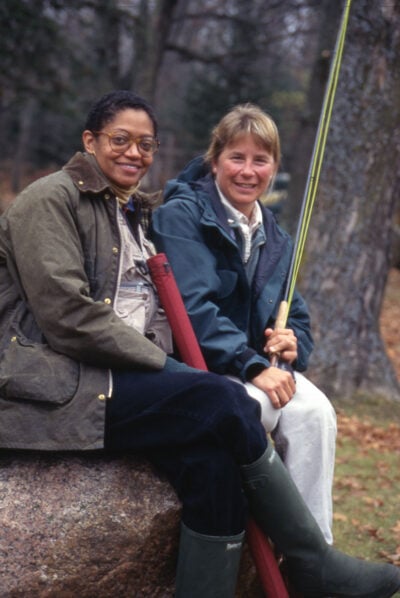
Casting for Recovery is the brainchild of two women — a reconstructive breast surgeon named Benita Walton and professional fly-fishing guide Gwenn Perkins Bogart, who saw an opportunity to empower women that had never been done before.
In 1996, Bogart invited her friend Walton — also an avid fly fisher — to go fly fishing. Walton recognized that the overhand motion of fly casting would be excellent physical therapy for her breast cancer patients, and that placing women in a stress-free environment — on the water — connecting with nature and with other breast cancer survivors would greatly contribute to their emotional recovery. Both understood that healing involved more than just treatment — it is about restoring strength, connection, and hope.
Combining their perspectives, they founded Casting for Recovery and held the first four retreats in 1998.
Why Fly Fishing?
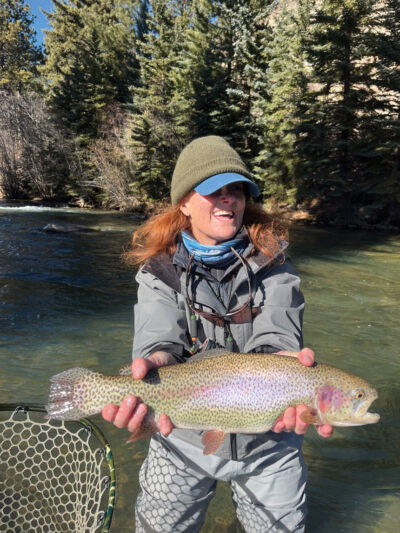
The gentle, rhythmic motion of fly casting, as Walton noted, provides good physical therapy for increasing mobility in the arm and upper body — similar to the exercises that most surgeons prescribe after surgery or radiation. The repetitive casting encourages the return of range of motion and muscular control and helps “break up” scar tissue.
At the retreats, fly fishing is about standing knee-deep in a stream or river and feeling the rush of water as it presses against you and heads downstream. Each cast has its own rhythm — the cast, the upstream “mend” of the line, watching the “float,” stripping the line back, and casting again are soothing, even spiritual.
Yes, it is about fishing, but it is also about sharing this magical time with all the beauty of nature — the mountains and the fast-moving stream, feeling warm sunlight on your skin, and hearing the birdsong in the stillness of an afternoon.
“The immersion in nature is therapeutic,” says Gaetz. “Women who come off the water say it is such a relief not to have thought about cancer for the past few hours.”
Healing Connections
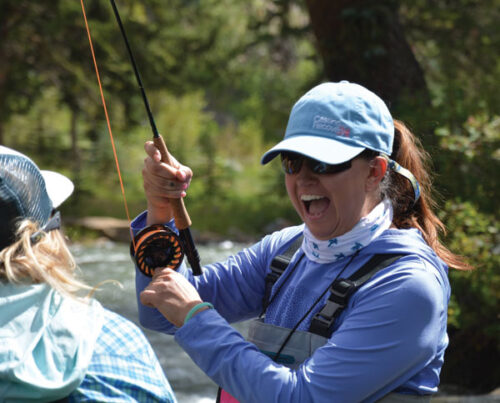
Walton and Bogart also recognized the importance of women talking with other women about their personal cancer journeys. Couple the physical benefits of fly fishing with the emotional benefits of connecting with nature and other women, and you have powerful medicine.
At CfR, everyone has a different story, but they share the same experience.
Everyone understands. Everyone has been there. Because they don’t have to explain or go through the whole story of the agony of the diagnosis, the surgery, and the months of radiation and chemotherapy, they can have much deeper conversations about how cancer has affected their lives and their families. Women can talk from the heart — whether sad, angry, or blessed to be alive — and other women in the group understand.
“We wanted to keep the focus of being a fly-fishing retreat,” says Bogart, “but at the same time provide information and to provide opportunities for women to have spontaneous conversations in an environment of trust and healing.”
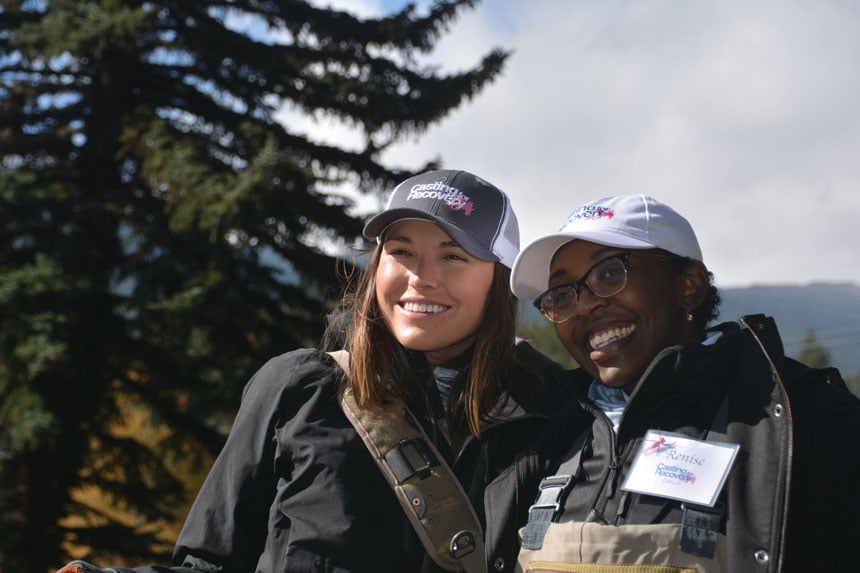
What to Expect at a Retreat
A typical retreat starts on Friday afternoon with arrival, check-in, icebreaker activities to get everybody comfortable with one another, and sitting down to a healthful evening meal.
During the weekend, women learn the basics of fly fishing — how to cast, knot tying, entomology (bugs), and choosing the fly that will attract the local fish. On the water, each participant has her own guide to teach them fly fishing skills. There is also plenty of time to hike or simply sit and talk with other participants.
The weekend also includes meetings with oncology medical and psychosocial professionals — LCSWs, LPCs, social workers, breast nurse navigators, RNs, and physicians — who provide education and answer questions about everything from how to prevent lymphedema to sexual health after breast cancer. Those hesitant to speak up are offered one-on-one time. Every question is answered thoughtfully. No question is considered trivial.
The retreats are composed of all women until “Fly Fishing Day,” when both men and women fishing guides participate. They come from organizations like Sisters on the Fly, Trout Unlimited, and Fly Fishers International. Many of the men fishing guides who volunteer do so because they have been affected by breast cancer. Perhaps their mother, wife, sister, or daughter has been diagnosed, and they want to honor that person.
Nearly 30 years later, the founders’ vision has blossomed into a nationwide movement that empowers a diverse community of women — from their 20s to their 90s — to reclaim their strength through the healing power of fly fishing. The CfR model has inspired affiliate programs in other countries too, including Australia, New Zealand, Canada, the United Kingdom, the Republic of Ireland, Italy, and Iceland.
Women — whether just diagnosed, in the middle of cancer treatment, in remission, or declared cancer-free — need more than just medical treatment. “The retreats offer opportunities for women to find inspiration, discover renewed energy for life, and experience healing connections with other women and with nature,” says Gaetz. “We give connection, community, and the chance to feel whole again … healing that medicine alone can’t offer.”
One of Lisa Abel’s most profound memories of that sunny weekend in 2017 was standing in the river, wearing waders, with a fishing guide by her side. “I closed my eyes and felt the anxiety and pain of the previous 10 months being slowly swept away by the Salmon River,” she says. “I count my blessings every day, and continue to fish and to volunteer.”
To participate, volunteer, or donate, visit castingforrecovery.org.
Irene Rawlings has written for Global Traveler, AFAR, O, the Oprah Magazine, and The Wall Street Journal, among other publications, and is the author of four books, including Sisters on the Fly.
This article is featured in the September/October 2025 issue of The Saturday Evening Post. Subscribe to the magazine for more art, inspiring stories, fiction, humor, and features from our archives.
Become a Saturday Evening Post member and enjoy unlimited access. Subscribe now


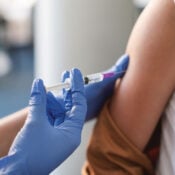

Comments
Articles from the SEP are such a welcome arrival in my inbox. My husband found the online version a few years ago and often shares. As with this article, you often share such interesting information and as with this article about cancer, you share hope vs optimism. Optimism is too often a syrupy, false promise that also diminishes the issue. Think positive, all will be okay, the positive thinker offers! Too easy to shut down someone’s challenging story by pronouncing optimism on them. This article brought me to tears hearing the stories of hope this program offers. “We give connection, community, and the chance to feel whole again … healing that medicine alone can’t offer.” The science doesn’t always cut it and to realize this whether a patient or medical professional is life affirming on so many levels.
I am going through radiation for Follicular Lymphoma in my tonsil. Fortunately, I have a very good prognosis and the treatments are short and low dose, usually about two Carpenter’s or some other requested oldie song long. 5 down and 7 treatments to go. The cancer club is a membership no one wants, but I have been amazed at how many people are in it. Many who I play pickle ball with and I would have never guessed. I have learned so much from others, about PET scans and bone marrow biopsies and am thankful there is a top rated cancer center literally in my back yard. (I walked to several treatments this past week)
Thanks for a wonderful, hopeful, informative article. I am passing it on.